Young and blossoming: 2019 Sports Meet Opening
In the beautiful morning breeze, the flamboyant national flag is flowing in the bright blue sky. There came the opening of the 23rd Sports Meet of South China Business College on November 14, with formations of schools and departments marching in neatly and joyfully to the majestic beats of the Athlete March. Did you remember those college students and professors of the new era, their outpouring dynamism and fighting spirit? Now Let’s take a look again at those young and blossoming faces that have been captured by the lenses of our student reporters.
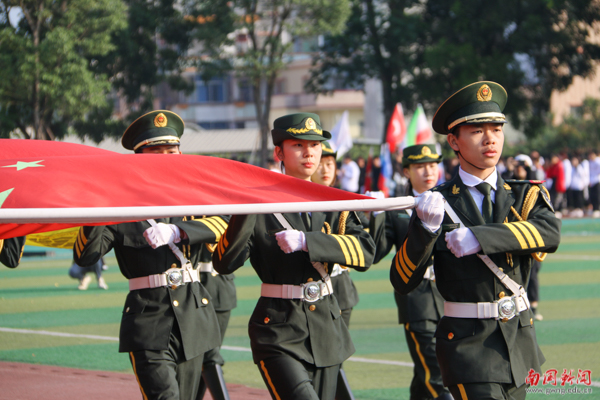
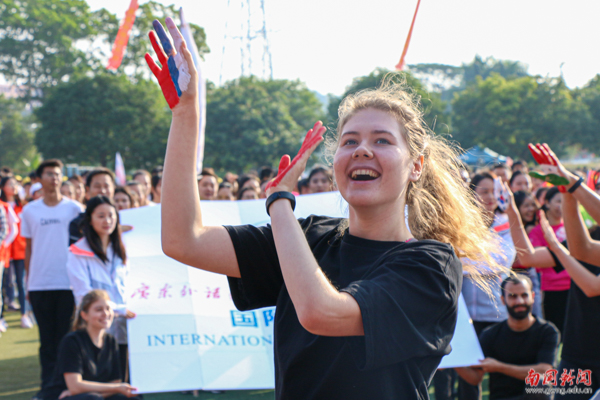

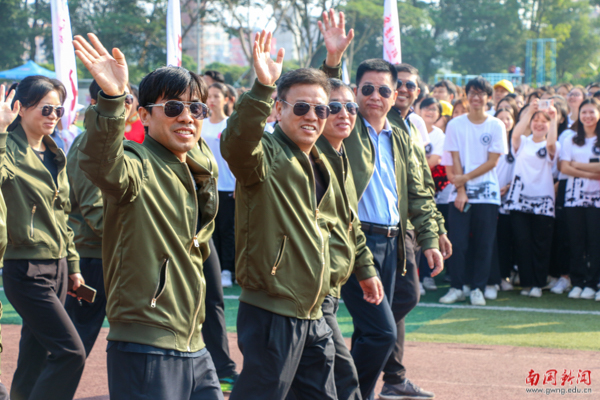
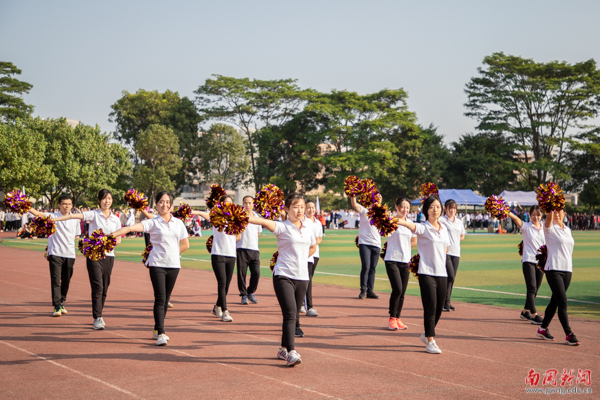
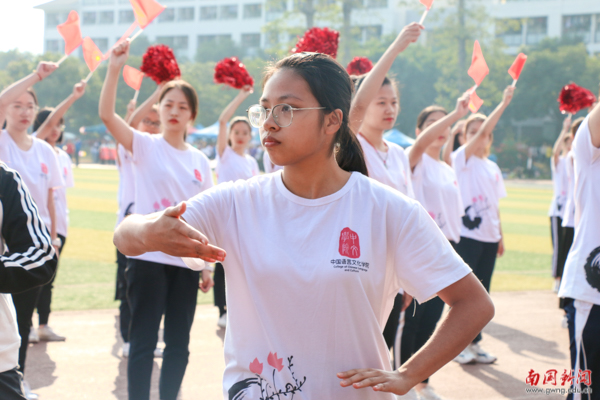
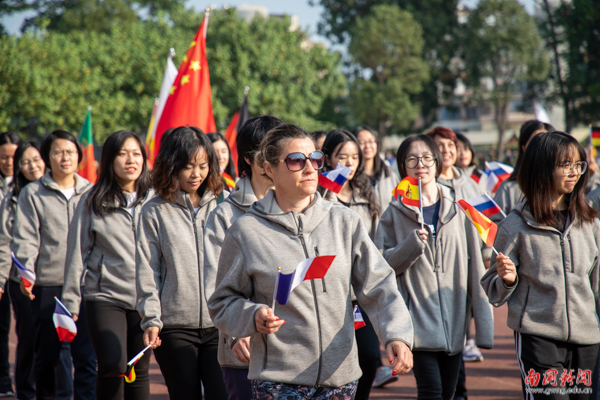

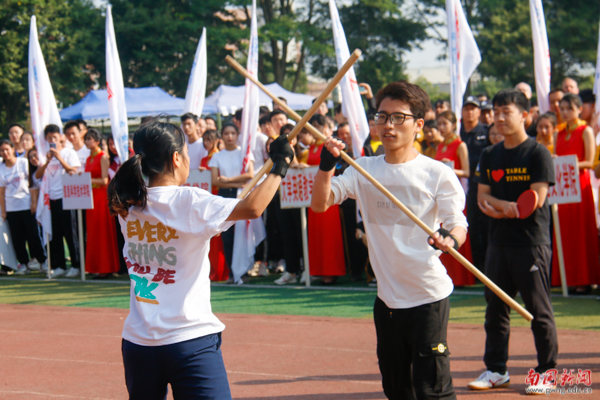

SCBC holds international symposium on translation and interpreting
On November 16, the 3rd International Symposium on “Globalization: Challenges for Translators and Interpreters” was held at South China Business College. The Symposium, with English as its working language, was co-organized by SCBC’s School of English Language and Culture and Jinan University’s School of Translation Studies. Executive President Wang Hua, Vice President Wang Xinjie, and Vice President Zhao Chen were present on the occasion, which was also an important part of the College’s effort to build up its provincial key program “English Language and Literature”. Prof. Zhao Youbin and Prof. Chen Yiping, who are respectively dean and deputy dean of Jinan University’s School of Translation Studies, and Prof. Chen Sheng, deputy dean of SCBC’s School of English Language and Culture, stood as hosts for the general conference successively.
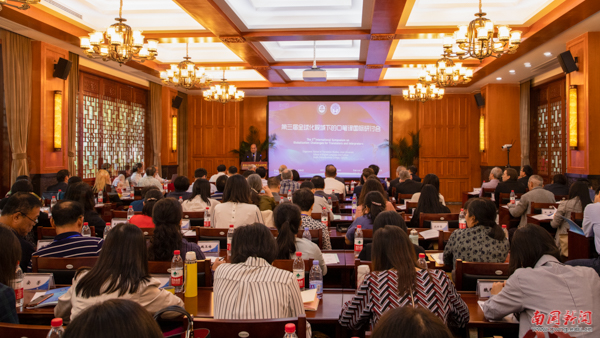
About 150 experts and scholars attended the Symposium, who have come from 46 domestic higher institutions and nine foreign countries and regions, including Spain, New Zealand, America, Britain, Brazil, Australia, Algeria, the Hong Kong SAR, and the Macau SAR. Participants will exchange opinions on the following topics: translation theories and practice; translation and intercultural communication; standards for translation and interpreting; translation education; applied studies of translation and interpreting to serve the “Belt and Road” initiative and the Greater Bay Area.
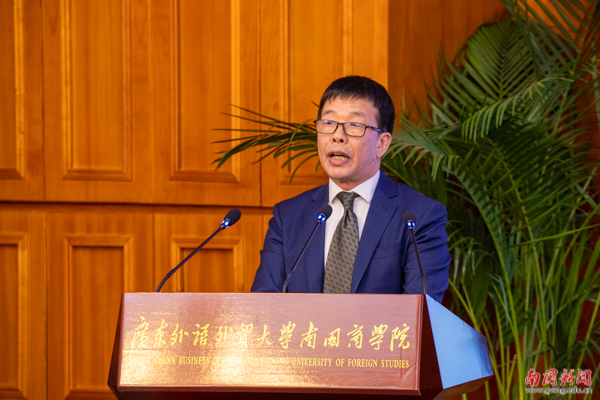
At the opening ceremony, Executive President Wang Hua delivered a welcoming speech on behalf of South China Business College. According to the Executive President, the School of English Language and Culture is one of the leading schools in SCBC and offers three programs: translation and interpreting, English, and Business English. Since its establishment, the Department of Translation and Interpreting has been committed to cultivating professional translators and interpreters with a global mindset and intercultural communication competence. It has built up a strong faculty team, consisting of well-known professors, specialists and professionals with rich experience and expertise in the field of translation studies and education. The Department also invites renowned scholars, professors, and visiting academics worldwide to enhance academic exchange. And today’s symposium is such an occasion.
With the implementation of the the “Belt and Road” initiative and the development of Guangdong-Hong Kong-Macau Greater Bay Area, there is an ever increasing demand for qualified translators and interpreters. However, the rapid advancements in artificial intelligence have brought about the increase in automated machine translation tools, posing challenges yet bringing opportunities to this field as well. Therefore, it is time for scholars of translation and interpreting and the related fields to come together and discuss the relevant issues at present and in the future. This symposium is a significant academic event for scholars and educators committed to the study of translation and interpreting. He hoped that this symposium will be a great success not only as a chance to share inspiring ideas and experience but also as the beginning of a long and fruitful cooperation and friendship between scholars and educators.
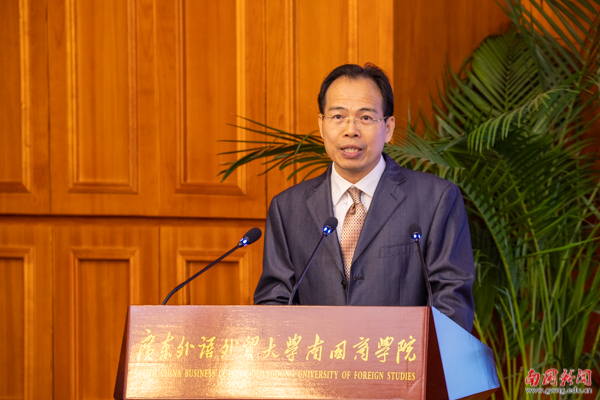
Prof. Zeng Wenxiong, deputy director of the Subcommittee of Translation Specialty under the Advisory Committee on Teaching Foreign Languages to Undergraduates in Higher Institutions of Guangdong province, delivered a speech. He said that under the context of globalization, translation studies call for increasing cooperation. As translatology has undergone a shift from a single disciplinary to interdisciplinary and then to trans-disciplinary studies, translation studies need more cooperation from other disciplines to explore innovative theoretical framework and methodology. Facing the challenges in the new era and globalization, translators and interpreters have to shoulder more responsibilities. Translation studies should value the study of translation teaching and the training of outstanding translators and interpreters for global language services.

In the keynote speech session, several celebrated experts in translation studies have shared their insights with the audience.
Roberto A. Valdeón, full professor in English Studies at the University of Oviedo, Spain and editor-in-chief of Perspectives: Studies in Translation Theory and Practice, talked about “Politeness in Intercultural and Interlinguistic Communication” in which he reviewed relevant concepts in pragmatics regarding politeness to argue that translators and interpreters need to be trained in this respect to avoid serious communication breakdowns.
Tan Zaixi, distinguished professor of Shenzhen University and chair professor of Beijing Foreign Studies University, and professor emeritus of Hong Kong Baptist University, shared his findings in the research of “the Politics of Media Production and Translation” which studies how Chinese media like The People’s Daily have approached the China-DPRK relationship before and after Chairman Kim Jong-un of the Democratic People’s Republic of Korea’s first visit to China in March 2018.
Sun Yifeng, chair professor of Translation Studies and head of the English Department at the University of Macau, talked on the topic “Translation and Back Translation: Transcultural Reinventions in some Chinese American Literary Works” with examples taken from Moments in Peking by Lin Yutang. He argued that Chinese American literature draws on its cultural material from the “native” Chinese culture in combination with American literary tradition. The retelling of Chinese stories, therefore, involves indirect translation and direct rewriting based on fascinating transnational experiments. When Chinese American literary texts are translated into Chinese, translators should be aware of and sensitive to the transnational and intercultural nature of such “back translation” and adjust their strategies of translation accordingly.
Prof. Ning Yizhong compared the two versions of A Dream of Red Mansions, one by Yang Hsien-Yi and Gladys Yang and the other by David Hawkes in his paper “Palm off the Dummy: Cultural Evolution and Its Challenge to Translation” and analyzed culture evolution and the appropriateness of choosing obsolete set phrases for modern readers (even for native speakers) in translation. He argued that translators and researchers should rethink the meaning of Western literary theory in the context of Chinese culture. Prof. Ning is chair professor of Beijing Language and Culture University, distinguished professor of Shenzhen University, visiting professor of Macao University of Science and Technology, and doctoral supervisor.
Prof. Wang Xiaoning compared “Between Earth and Sky”, an original story written in English by a well-known New Zealand writer, and its Chinese translation by Wang Meng. He dug deep into how meaningful structure plays an important role in translation through comparing the two versions of lexical or semantic meanings of the words in the original story. Prof. Wang is registered chief PhD supervisor and courses coordinator for the International Languages and Culture Program, the School of Arts, Waikato University, New Zealand.
In the parallel sessions on the afternoon of November 16, scholars and researchers had exciting discussions on the six topics of Translation Teaching, Globalization and Translation, Translation Theories and Skills, Applied Translation Studies, Translation of Political and Diplomatic Discourses, and Literary Translation.
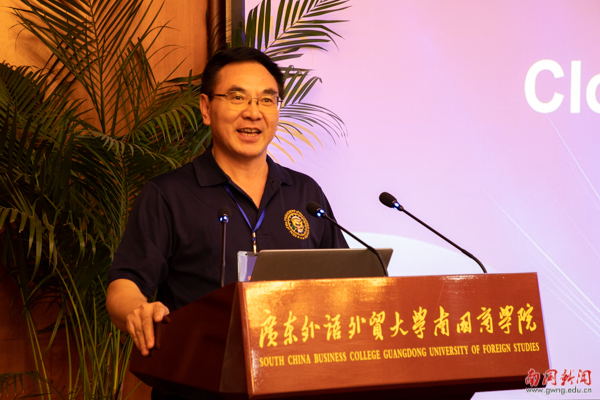
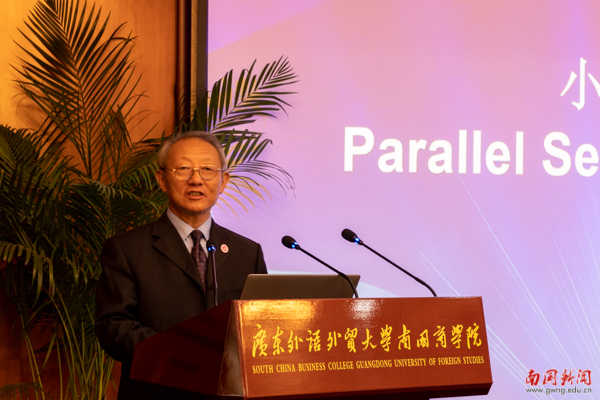
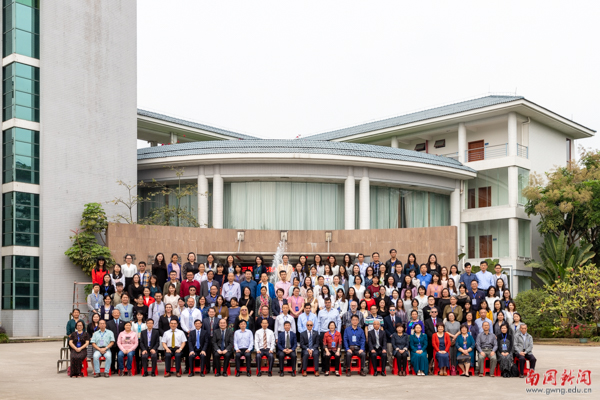
In the closing ceremony, Prof. Zhao Youbin applauded the efforts of the two organizers that had made the Symposium a great success. He said that the Symposium has fulfilled its role of bringing domestic translation studies in line with the latest developments globally, and this will surely help boost the progress of related disciplines in higher institutions in China, particularly Jinan University and South China Business College, GDUFS. The Symposium came to an end in rounds of applause of all participants.
时间:Nov 25, 2019 10:25:00 AM
录入者:谢丰